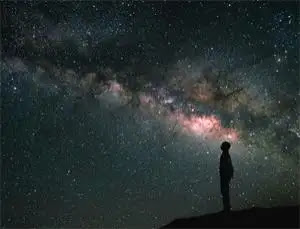Pondering Existence: A Journey into the Depths of Human Inquiry
Original Image is on this LINK
Introduction: Unlocking the Mysteries of Existence
In the vast expanse of the universe, amidst the
swirling galaxies and shimmering stars, lies one of the most profound mysteries
known to humankind: existence itself. From ancient philosophers to modern
scientists, humans have grappled with the question of why anything exists at
all. This journey into the depths of existential inquiry not only challenges
our intellect but also stirs the very essence of our being.
The Quest for Understanding
Since the dawn of civilization, humans have sought
to understand their place in the cosmos. Early societies turned to myths and
religious narratives to explain the origins of existence, attributing creation
to divine beings or cosmic forces. Yet, as humanity progressed, so too did its
curiosity, leading to the emergence of philosophical inquiry.
Ancient Greek philosophers such as Socrates, Plato,
and Aristotle delved into the nature of reality, questioning the fundamental
principles underlying existence. Plato's allegory of the cave, with its
exploration of perception and truth, remains a timeless metaphor for the human
quest to uncover deeper realities beyond the surface of our everyday
experiences.
The Shift Towards Scientific Inquiry
With the rise of the scientific revolution, humanity
witnessed a paradigm shift in its approach to understanding existence.
Empirical observation, experimentation, and rational analysis became the
cornerstones of inquiry, leading to groundbreaking discoveries in physics,
biology, and cosmology.
Visionaries like Galileo Galilei and Isaac Newton
shattered long-held beliefs, ushering in an era of enlightenment that
challenged the dogmas of the past. Newton's laws of motion and universal
gravitation provided a framework for understanding the mechanics of the cosmos,
while Darwin's theory of evolution offered a naturalistic explanation for the
diversity of life on Earth.
The Mysteries of Quantum Mechanics
Despite the remarkable progress of science, the
nature of existence remains enigmatic, particularly at the quantum level.
Quantum mechanics, the branch of physics that governs the behavior of subatomic
particles, defies the intuitions of classical physics, presenting a reality
that is stranger than fiction.
In the quantum realm, particles can exist in
multiple states simultaneously, a phenomenon known as superposition, and can
become entangled, meaning their fates are intertwined regardless of the
distance separating them. Furthermore, the act of observation itself influences
the behavior of particles, raising profound questions about the role of
consciousness in shaping reality.
The Universe as a Cosmic Symphony
As scientists probe ever deeper into the mysteries
of existence, a tantalizing picture of the universe emerges—one akin to a
cosmic symphony, with each particle, galaxy, and black hole playing its part in
the grand tapestry of reality. From the delicate dance of atoms to the majestic
ballet of celestial bodies, existence unfolds in a symphony of harmonies and
dissonances.
The concept of the multiverse, proposed by some
theoretical physicists, suggests that our universe is but one of many parallel
realities coexisting within a vast cosmic ensemble. In this view, the laws of
physics vary across different universes, offering an explanation for the
fine-tuning of our own universe that allows for the emergence of life.
Existential Implications
The contemplation of existence extends beyond the
realm of scientific inquiry, permeating every facet of human experience.
Existentialist philosophers such as Jean-Paul Sartre and Albert Camus grappled
with the inherent absurdity and meaninglessness of existence, asserting that
individuals must confront the void and create their own meaning in a seemingly
indifferent universe.
Existential angst, the profound sense of
disorientation and anxiety in the face of existence, is a recurring theme in
literature, art, and psychology. From the existential crisis of Hamlet to the
existential dread of Edvard Munch's "The Scream," humanity's struggle
to find meaning amidst the chaos of existence echoes through the annals of
history.
Finding Meaning in the Midst of Uncertainty
While the mysteries of existence may elude
definitive answers, the journey of inquiry itself imbues life with a sense of
wonder and purpose. Whether through scientific exploration, philosophical
contemplation, or artistic expression, humans continue to seek meaning and
significance in a universe that remains infinitely complex and unknowable.
The search for understanding binds us together as a
species, transcending cultural, religious, and ideological divides. In our
shared quest to unlock the secrets of existence, we find common ground and
forge connections that bridge the gaps between us.
Conclusion: Embracing the Mystery
As we ponder the unfathomable depths of existence,
let us embrace the mystery with humility and awe. For in the vastness of the
cosmos, amidst the swirling galaxies and shimmering stars, lies a universe
waiting to be discovered—a universe that invites us to explore, to question,
and to marvel at the sheer wonder of being.
As we journey onward, let us remember that it is not
the destination that defines us, but the quest itself—the relentless pursuit of
truth, beauty, and understanding that animates our existence and propels us
ever forward into the unknown.
In the end, perhaps the true essence of existence
lies not in the answers we seek, but in the questions that inspire us to
ponder, to wonder, and to dream. For it is in the quest for understanding that
we find meaning, purpose, and ultimately, ourselves.




Comments
Post a Comment